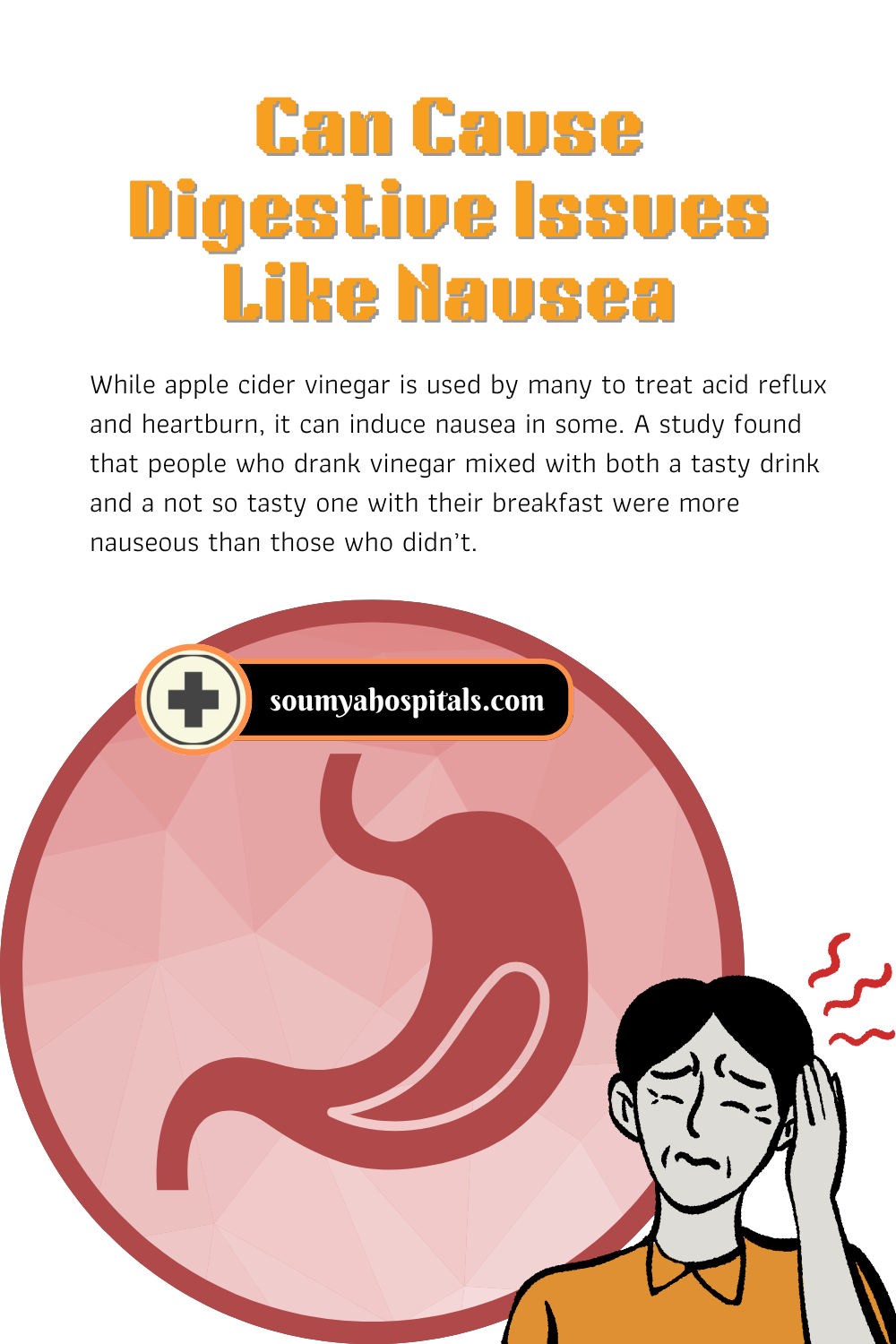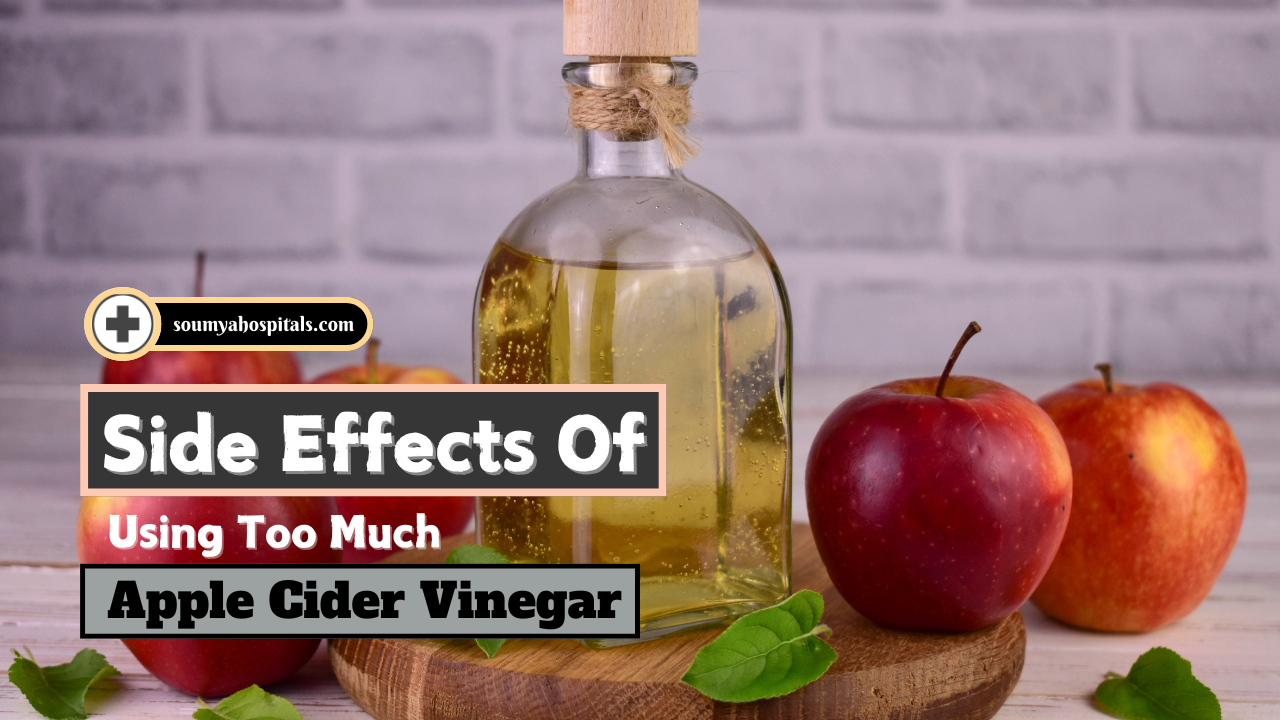Apple cider vinegar (ACV) has a huge fan following. Most natural medicine enthusiasts claim that it helps deal with many medical conditions, from diabetes to dental problems. Weight watchers take it routinely to lose weight, and with good reason. Some people even claim it can fight cancer. Here’s a list of proven benefits of apple cider vinegar.
While it does help with digestion, blood pressure, and cholesterol, if you drink too much of it or do not dilute it, you may experience several side effects of apple cider vinegar.
Most of the apple cider vinegar side effects we have listed here are based on anecdotal evidence from real-life users. But whether you will at all experience these side effects and how severe they will be for you also depends on your general health and lifestyle. Here are 8 side effects of too much apple cider vinegar.
Also Read: 7 Benefits Of Apple Cider Vinegar With Honey, Ginger, And Turmeric
1. Can Delay Digestion In Some Diabetic Patients
Apple cider vinegar can help in managing diabetes by lowering post-meal blood sugar levels. It does this in two ways: by increasing insulin sensitivity and by delaying digestion or the passage of food from the stomach to the small intestine.
In healthy individuals, this delay is not a concern. But some diabetes type 1 patients have gastroparesis, a condition where the stomach does not empty itself normally. Drinking apple cider vinegar may further delay gastric emptying and lead to nausea and an uncomfortable feeling of fullness. This may further worsen blood sugar control.
2. Can Lower Blood Sugar Below The Normal Level
Apple cider vinegar is a good choice to lower blood sugar spikes after meals. But if you are on blood sugar-lowering medicines, it may bring down the blood sugar level below normal, leading to hypoglycemia.
3. Can Cause Digestive Issues Like Nausea
While apple cider vinegar is used by many to treat acid reflux and heartburn, it can induce nausea in some. A study found that people who drank vinegar mixed with both a tasty drink and a not so tasty one with their breakfast were more nauseous than those who didn’t. Those who drank the unappetizing vinegar-containing drink were more nauseous, but the researchers found the difference insignificant. The unpalatability of vinegar is often the reason people try to take ACV pills. Which brings us to the next point.

4. ACV Pills May Injure The Food Pipe
While the demand for ACV pills and supplements is on the rise, researchers warn against using them. After a woman reported throat burn caused by an ACV tablet stuck in her throat, the American Dietetic Association tested 8 different brands of ACV tablets for their pH levels, acid content, and microbial activity.
The study found that the pills had pH values ranging from 2.9 to 5.7. It even doubted whether ACV was an ingredient. “The inconsistency and inaccuracy in labeling, recommended dosages, and unsubstantiated health claims make it easy to question the quality of the products,” the study concluded.
The normal pH of your esophagus or food pipe is close to 7, or almost neutral. A pill of pH 2.9 is highly acidic and is capable of burning the food pipe. The sensation can be even more severe than heartburn which has a threshold pH value of 4. Vinegar is also regarded unsuitable for direct consumption by children.
5. May Affect Bone Health
Reports of bone loss caused by drinking apple cider vinegar are very rare. But there has been one instance where an Austrian woman who had 8 oz of it daily for 6 years had osteoporosis and mild potassium deficiency. She excreted more than normal amounts of sodium, potassium, and bicarbonates through urine. The loss of bicarbonates leaves the body in an acidic state. Her doctors also found that the acid load from vinegar affected her bone mineral density – this is because a high acid load hinders bone formation and helps bone loss.
The quantity she drank might seem ludicrous to many of us. But if we were to consider ACV as a beverage, 8 oz would not be too much. The point to be noted here is that ACV must not be used as a beverage. You must stick to the recommended dosage of ACV.
6. May Erode Tooth Enamel
Ever noticed how citrus fruits or drinks make your teeth sensitive? It is because the acid content in them affects your tooth enamel. Acetic acid in ACV is a weak acid, but if you drink it undiluted and in large quantities, tooth decay may occur.
In North African cultures, young women and bodybuilders are known to use apple cider vinegar for weight loss. A study published in the Dutch Journal Of Dentistry reports that consuming 8 oz or a glass of ACV every day caused tooth enamel erosion in a 15-year-old Moroccan girl.
Most people don’t drink that much anyway, but people with sensitive teeth might do better to dilute their ACV further.
7. May Increase Urination Frequency
Be careful with your apple cider vinegar when on diuretics. ACV flushes out toxins and makes you urinate more often. If continued, this could lead to dehydration.
Having said these, we would like to emphasize that ACV indeed helps with weight loss, heartburn, and cholesterol to name a few. But drinking too much ACV or in a concentrated form is potentially harmful. Thankfully, all of these conditions are treatable and can be reversed with non-usage or even lowering the quantity.

8. May Cause Skin Irritation
The Internet is teeming with “how to” guides on removing moles or nevi using apple cider vinegar. We have also had many readers tell us that it has worked for them. However, there have also been reports of chemical burns caused by the unsupervised use of apple cider vinegar.
In one case, a teenage girl who used ACV on her nevi and then covered them with bandages had redness, irritation, and burns. The doctor advised her that many such home remedies could lead to scarring and hyperpigmentation and could even turn malignant.
In another case, when vinegar was applied on the skin of a newborn who had fever, it caused chemical burns. The acetic acid in vinegar is a weak acid but has the ability to burn sensitive skin.
In an 8-year-old boy, applying ACV directly on areas of viral skin infection and covering them with bandages caused a burning sensation and purple discoloration. The doctors identified these as chemical burns. If you have inflamed or scaly skin or a dry scalp, the low pH content may cause further irritation.
While many claim that ACV is good for the skin because of its pectin, beta-carotene, and vitamin C content, a USDA report confirms that it does not contain such nutrients in detectable amounts.
To conclude, the benefits of apple cider vinegar outweigh the side effects but only when had in moderation and in the correct way. Continue drinking it but keep a tab on your consumption.
